 Two hours with Mia Couto in an engaging conversation that covers various aspects of his interests and career, his affective geographies, the diversity of peoples and their ways of life as inspiration for the stories, the environment, and the development model to be discovered, and how to treat nature not as a "resource". We talked about hard times of violence, and the utopia of Mozambican Independence. Literary subjects do not predominate, although the Mozambican author wishes he had more time to dedicate to writing. Also thinking about how to take the pleasure of reading further and how to help bring out new writers. A writer in the terrain.
Two hours with Mia Couto in an engaging conversation that covers various aspects of his interests and career, his affective geographies, the diversity of peoples and their ways of life as inspiration for the stories, the environment, and the development model to be discovered, and how to treat nature not as a "resource". We talked about hard times of violence, and the utopia of Mozambican Independence. Literary subjects do not predominate, although the Mozambican author wishes he had more time to dedicate to writing. Also thinking about how to take the pleasure of reading further and how to help bring out new writers. A writer in the terrain.
Face to face
22.05.2023 | by Marta Lança
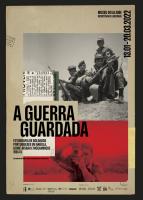 During their years at war, thousands of the young recruits sent to Angola, Guinea-Bissau and Mozambique took photos of what surrounded them: their comrades, barracks, landscapes, daily life, the civilian population, and the military apparatus. These images managed to evade the censorship of the regime, and were stored away or sent by mail as proof of their distant lives.
Some of these men built improvised darkrooms, others managed to access official ones. Many visited photography shops that flourished as a consequence of the demand generated by the war, and many bought and exchanged images. All this created the photographic archives of which we here present a part.
During their years at war, thousands of the young recruits sent to Angola, Guinea-Bissau and Mozambique took photos of what surrounded them: their comrades, barracks, landscapes, daily life, the civilian population, and the military apparatus. These images managed to evade the censorship of the regime, and were stored away or sent by mail as proof of their distant lives.
Some of these men built improvised darkrooms, others managed to access official ones. Many visited photography shops that flourished as a consequence of the demand generated by the war, and many bought and exchanged images. All this created the photographic archives of which we here present a part.
I'll visit
05.01.2022 | by Inês Ponte and Maria José Lobo Antunes
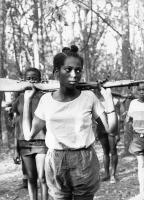 No history of decolonization or of decolonizing praxes is ever completed without attention to gender. How did women view the liberation struggles in the former Portuguese colonies? How were their ways of seeing integrated or not in the imagination of colonialism? Was there a specific gaze to women over the liberation struggles? What knowledge and awareness do we have of/about these ways of seeing? And how do these ways of seeing intersect with those of contemporary filmmakers, artists, curators and academics who are now questioning public and private archives, are visually recreating their memories or re-imagining colonialism? What role academic research, archive conservation policies, programming and curatorship have in questioning or prolonging (official) “politics of memory”?
No history of decolonization or of decolonizing praxes is ever completed without attention to gender. How did women view the liberation struggles in the former Portuguese colonies? How were their ways of seeing integrated or not in the imagination of colonialism? Was there a specific gaze to women over the liberation struggles? What knowledge and awareness do we have of/about these ways of seeing? And how do these ways of seeing intersect with those of contemporary filmmakers, artists, curators and academics who are now questioning public and private archives, are visually recreating their memories or re-imagining colonialism? What role academic research, archive conservation policies, programming and curatorship have in questioning or prolonging (official) “politics of memory”?
Afroscreen
22.05.2021 | by Ana Cristina Pereira (AKA Kitty Furtado), Inês Beleza Barreiros and Maria do Carmo Piçarra
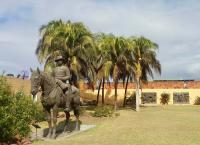 According to a government decision of the same year, Independence squares were to be set up in all provincial capitals and to receive identical but smaller statues produced in North Korea by Mansudae Art Studio: the statue erected in the capital is 9 meters high, while those implanted in other cities are 2.9 meters high.
According to a government decision of the same year, Independence squares were to be set up in all provincial capitals and to receive identical but smaller statues produced in North Korea by Mansudae Art Studio: the statue erected in the capital is 9 meters high, while those implanted in other cities are 2.9 meters high.
To read
11.06.2020 | by Roberto Conduru
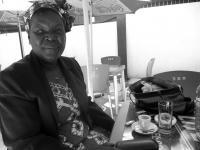 Paulina Chiziane (Majacaze, 1955) is surely one of the most prominent figures of current Mozambican literature, and not just that. She is an essential reference for the country’s feminist movements, a woman who confronted particularly conflictual aspects of African cultures in her literary works with startling intensity, developing themes that no one else wants to hear or discuss, not in the private sphere, much less in the public or political spheres. These are silenced themes, taboos, especially painful, pending and unresolved subjects, such as the Mozambican civil war, women’s rights in polygamy and black magic.
Paulina Chiziane (Majacaze, 1955) is surely one of the most prominent figures of current Mozambican literature, and not just that. She is an essential reference for the country’s feminist movements, a woman who confronted particularly conflictual aspects of African cultures in her literary works with startling intensity, developing themes that no one else wants to hear or discuss, not in the private sphere, much less in the public or political spheres. These are silenced themes, taboos, especially painful, pending and unresolved subjects, such as the Mozambican civil war, women’s rights in polygamy and black magic.
Face to face
25.02.2019 | by Doris Wieser
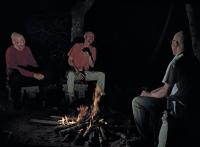 We asked an albino guy if he could tell any jokes about the Portuguese, he laughed and said, a Portuguese man arrived here in Maputo, couldn’t believe his eyes, and asked a smart and friendly looking native what they called motherfuckers in Mozambique. But sir, we don’t call them, they come from Lisbon of their own accord. And there we were, two motherfuckers in Maputo, 38 years after independence and 20 years after the civil war, the old drunk woman shouting, her eyes irradiating blood and misery, give me a mulatto, give me a mulatto or money, motherfucker.
We asked an albino guy if he could tell any jokes about the Portuguese, he laughed and said, a Portuguese man arrived here in Maputo, couldn’t believe his eyes, and asked a smart and friendly looking native what they called motherfuckers in Mozambique. But sir, we don’t call them, they come from Lisbon of their own accord. And there we were, two motherfuckers in Maputo, 38 years after independence and 20 years after the civil war, the old drunk woman shouting, her eyes irradiating blood and misery, give me a mulatto, give me a mulatto or money, motherfucker.
To read
24.04.2013 | by João Maria Gusmao + Pedro Paiva
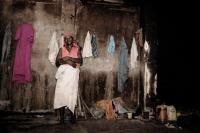 The "resource curse" is a term used to characterize the risks faced by poor countries where natural resources that are object of international greed are discovered. The promise of abundance arising from the enormous commercial value of resources and from the investments required to achieve it is so convincing that it starts to influence the pattern of economic, social, political, and cultural development.
The "resource curse" is a term used to characterize the risks faced by poor countries where natural resources that are object of international greed are discovered. The promise of abundance arising from the enormous commercial value of resources and from the investments required to achieve it is so convincing that it starts to influence the pattern of economic, social, political, and cultural development.
To read
06.12.2012 | by Boaventura de Sousa Santos
 This spurs the women to defiantly band together to undertake a real revolutionary action and assert their independence from their "liberators." An evocative exposé of a little-known chapter in the contemporary history of Mozambique, Virgin Margarida is a dramatic and inspiring elegy to the insurgent spirit of women across nations, histories and cultures.
This spurs the women to defiantly band together to undertake a real revolutionary action and assert their independence from their "liberators." An evocative exposé of a little-known chapter in the contemporary history of Mozambique, Virgin Margarida is a dramatic and inspiring elegy to the insurgent spirit of women across nations, histories and cultures.
Afroscreen
22.08.2012 | by vários
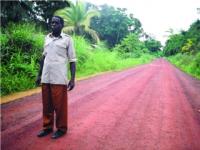 Stating that sorcery exists in Mozambique is a mere declaration of an obvious and recurring fact. People may use it in order to obtain active results or to protect oneself from undesirable events, in the pursuance of legitimate or illegitimate, beneficial or malevolent goals. The effectiveness of this practice is, nonetheless, an issue that tends to divide readers between outspoken scepticism, attitudes of plausible doubt, complex speeches about its symbolic efficacy, and a somewhat apprehensive fear or agreement.
Stating that sorcery exists in Mozambique is a mere declaration of an obvious and recurring fact. People may use it in order to obtain active results or to protect oneself from undesirable events, in the pursuance of legitimate or illegitimate, beneficial or malevolent goals. The effectiveness of this practice is, nonetheless, an issue that tends to divide readers between outspoken scepticism, attitudes of plausible doubt, complex speeches about its symbolic efficacy, and a somewhat apprehensive fear or agreement.
To read
15.09.2011 | by Paulo Granjo
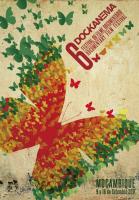 This year, as we embark on the sixth edition of Dockanema, my purpose is also one of remembrance, so that we do not forget the importance of documentaries in our society, and above all in our collective memory. To reaffirm this purpose once more, there could be no better choice for the opening of the 6th Dockanema than the Patrício Guzman film Nostalgia da Luz, in an edition intended to pay homage to the master filmmaker Ruy Guerra.
This year, as we embark on the sixth edition of Dockanema, my purpose is also one of remembrance, so that we do not forget the importance of documentaries in our society, and above all in our collective memory. To reaffirm this purpose once more, there could be no better choice for the opening of the 6th Dockanema than the Patrício Guzman film Nostalgia da Luz, in an edition intended to pay homage to the master filmmaker Ruy Guerra.
Afroscreen
07.09.2011 | by Pedro Pimenta
 The writer of '20 Navios' speaks to us of the chronicle and its melancholy, opening with “This (rear?) Window”, where he probes his identitary affiliations - the aforementioned triangle-: “From this window before me, when night falls, and Lisbon turns to dust beneath the anonymous city lights, I may imagine myself in Maputo, Havana, or Rio, or whatever other of my stomping grounds, but I know now that I can never fool myself, because I am inevitably alone, with my afro-latin schizophrenia.
The writer of '20 Navios' speaks to us of the chronicle and its melancholy, opening with “This (rear?) Window”, where he probes his identitary affiliations - the aforementioned triangle-: “From this window before me, when night falls, and Lisbon turns to dust beneath the anonymous city lights, I may imagine myself in Maputo, Havana, or Rio, or whatever other of my stomping grounds, but I know now that I can never fool myself, because I am inevitably alone, with my afro-latin schizophrenia.
Afroscreen
07.05.2011 | by Luís Carlos Patraquim
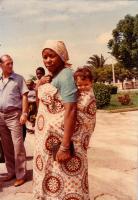 Why am I not black. Or rather, how did I end up a Mozambican?
These questions about identity are normal. They come up more often when I’m not in Mozambique due to (I assume) lack of historical knowledge. But what does a Mozambican look like? Mozambique, as a nation, didn’t exist until 1975. It was then it was born, a carrier of other nations within its borders, of ethnicities as varied as Shangana, Makonde, descendants from Swahili and Arabs from the North, descendants from Goan, Pakistani, Portuguese, Ronga and so on. With that new country came a new nationality — Mozambican.
Why am I not black. Or rather, how did I end up a Mozambican?
These questions about identity are normal. They come up more often when I’m not in Mozambique due to (I assume) lack of historical knowledge. But what does a Mozambican look like? Mozambique, as a nation, didn’t exist until 1975. It was then it was born, a carrier of other nations within its borders, of ethnicities as varied as Shangana, Makonde, descendants from Swahili and Arabs from the North, descendants from Goan, Pakistani, Portuguese, Ronga and so on. With that new country came a new nationality — Mozambican.
Face to face
27.04.2011 | by Rui Tenreiro
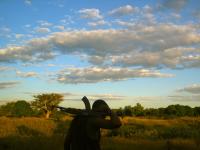 In the country with a Kalashnikov in its flag we were walking a long way to meet a musician and record some of his tunes for the soundtrack to a documentary. Tobias Dzandiwandira is a practically unknown talent, for he lives with his large family an hour and a half away from the nearest road in Mozambique’s centre-west, close to the border with Zimbabwe.
In the country with a Kalashnikov in its flag we were walking a long way to meet a musician and record some of his tunes for the soundtrack to a documentary. Tobias Dzandiwandira is a practically unknown talent, for he lives with his large family an hour and a half away from the nearest road in Mozambique’s centre-west, close to the border with Zimbabwe.
I'll visit
21.04.2011 | by Nuno Milagre
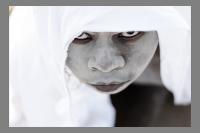 Mário Macilau is a photographer (of fragments) of reality. Macilau is a teller of stories and as he narrates he meditates through his images on the social, political and economic environment in his country and in the world, which he explores in its unfeigned naked and raw form. As he states himself, he does not stage or create the photographic moment. His images are instantaneous. He does not seek them, he finds them. Camera in hand, he approaches the countless anonymous people who appear in his work – it is the movement of contemporary man and his relationship with space that interest him.
Mário Macilau is a photographer (of fragments) of reality. Macilau is a teller of stories and as he narrates he meditates through his images on the social, political and economic environment in his country and in the world, which he explores in its unfeigned naked and raw form. As he states himself, he does not stage or create the photographic moment. His images are instantaneous. He does not seek them, he finds them. Camera in hand, he approaches the countless anonymous people who appear in his work – it is the movement of contemporary man and his relationship with space that interest him.
Face to face
11.04.2011 | by Sílvia Vieira
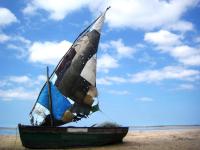 fter some back and forth travelling Lisbon-Madrid-Lisbon and some other back and forth travelling Maputo-Johannesburg-Maputo, I started finding linkage points between the voyage in the European Southwest and the voyage in the African Southeast. Both courses are about 375 miles long, from country to country, from capital to capital; syntonizing into another idiom when crossing the border, changing the bank notes for others – a step no longer necessary in the Iberian Peninsula. These are voyages in longitude, to the Orient: Madrid and Maputo; to the Occident: Lisbon and Johannesburg.
fter some back and forth travelling Lisbon-Madrid-Lisbon and some other back and forth travelling Maputo-Johannesburg-Maputo, I started finding linkage points between the voyage in the European Southwest and the voyage in the African Southeast. Both courses are about 375 miles long, from country to country, from capital to capital; syntonizing into another idiom when crossing the border, changing the bank notes for others – a step no longer necessary in the Iberian Peninsula. These are voyages in longitude, to the Orient: Madrid and Maputo; to the Occident: Lisbon and Johannesburg.
I'll visit
17.12.2010 | by Nuno Milagre
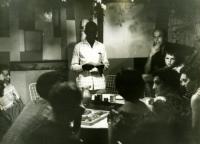 In contrast to the context of Francophile Africa, where the main interest was in literary works and an idea of blackness that involved the relatively contentious appropriation of European modernity, certain mediators, located further south, questioned the possible evolution of local cultures and of their own major artistic traditions, free from the subordination of European models, which were viewed in a critical way in terms of the visual arts. Within the framework of the inevitable death of the tribal art which was characteristic of traditional societies (even via tourist reproductions), new and spontaneous forms of artistic production (and also sophisticated forms of syncretism in the case of "natural synthesis" proposed by Uche Okeke in the Zaria School) were being sought without any nativist essentialism (in the cases of Beier, Guedes and Beinart).
In contrast to the context of Francophile Africa, where the main interest was in literary works and an idea of blackness that involved the relatively contentious appropriation of European modernity, certain mediators, located further south, questioned the possible evolution of local cultures and of their own major artistic traditions, free from the subordination of European models, which were viewed in a critical way in terms of the visual arts. Within the framework of the inevitable death of the tribal art which was characteristic of traditional societies (even via tourist reproductions), new and spontaneous forms of artistic production (and also sophisticated forms of syncretism in the case of "natural synthesis" proposed by Uche Okeke in the Zaria School) were being sought without any nativist essentialism (in the cases of Beier, Guedes and Beinart).
To read
17.12.2010 | by Alexandre Pomar
 José Cabral came to this collective history in a unique way, having trained with his father amateur photographer and filmmaker — he also had a homonymous grandfather, on his father’s side, who was a governor (1910-1938) and who had a park named after him in the old capital Lourenço Marques (Continuadores Park, today). He started in cinematography and he joined his experience as a news photographer to documental programmes of a less urgent nature. Later, he was probably the first to distance himself from the routines of journalism, and he made that challenge very clear with the choice of works in display in the Iluminando Vidas exhibit: instead of war, misery, victims, ruins and promises of reconstruction, that can still be seen yet another face for exoticism, he showed feminine nudes without any ethnographical pretext.
José Cabral came to this collective history in a unique way, having trained with his father amateur photographer and filmmaker — he also had a homonymous grandfather, on his father’s side, who was a governor (1910-1938) and who had a park named after him in the old capital Lourenço Marques (Continuadores Park, today). He started in cinematography and he joined his experience as a news photographer to documental programmes of a less urgent nature. Later, he was probably the first to distance himself from the routines of journalism, and he made that challenge very clear with the choice of works in display in the Iluminando Vidas exhibit: instead of war, misery, victims, ruins and promises of reconstruction, that can still be seen yet another face for exoticism, he showed feminine nudes without any ethnographical pretext.
Face to face
28.05.2010 | by Alexandre Pomar
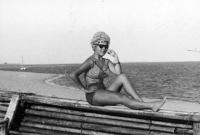 Filmed in 1965, “Catembe”, is a fictional documentary directed by Manuel Faria de Almeida about the everyday life in Lourenço Marques. The most outstanding aspect of this film is the fact that it represents the first critical interpretation of the Portuguese colonial reality. After the original piece was censored – with 103 cuts and obliteration of the censored parts – the second version was banned. Only half of its 2400 original metres survived, which led to a reference in the Guinness Book of Records as the film with most censored cuts in the history of cinema.
Filmed in 1965, “Catembe”, is a fictional documentary directed by Manuel Faria de Almeida about the everyday life in Lourenço Marques. The most outstanding aspect of this film is the fact that it represents the first critical interpretation of the Portuguese colonial reality. After the original piece was censored – with 103 cuts and obliteration of the censored parts – the second version was banned. Only half of its 2400 original metres survived, which led to a reference in the Guinness Book of Records as the film with most censored cuts in the history of cinema.
Afroscreen
16.05.2010 | by Maria do Carmo Piçarra
 Two hours with Mia Couto in an engaging conversation that covers various aspects of his interests and career, his affective geographies, the diversity of peoples and their ways of life as inspiration for the stories, the environment, and the development model to be discovered, and how to treat nature not as a "resource". We talked about hard times of violence, and the utopia of Mozambican Independence. Literary subjects do not predominate, although the Mozambican author wishes he had more time to dedicate to writing. Also thinking about how to take the pleasure of reading further and how to help bring out new writers. A writer in the terrain.
Two hours with Mia Couto in an engaging conversation that covers various aspects of his interests and career, his affective geographies, the diversity of peoples and their ways of life as inspiration for the stories, the environment, and the development model to be discovered, and how to treat nature not as a "resource". We talked about hard times of violence, and the utopia of Mozambican Independence. Literary subjects do not predominate, although the Mozambican author wishes he had more time to dedicate to writing. Also thinking about how to take the pleasure of reading further and how to help bring out new writers. A writer in the terrain.  During their years at war, thousands of the young recruits sent to Angola, Guinea-Bissau and Mozambique took photos of what surrounded them: their comrades, barracks, landscapes, daily life, the civilian population, and the military apparatus. These images managed to evade the censorship of the regime, and were stored away or sent by mail as proof of their distant lives.
Some of these men built improvised darkrooms, others managed to access official ones. Many visited photography shops that flourished as a consequence of the demand generated by the war, and many bought and exchanged images. All this created the photographic archives of which we here present a part.
During their years at war, thousands of the young recruits sent to Angola, Guinea-Bissau and Mozambique took photos of what surrounded them: their comrades, barracks, landscapes, daily life, the civilian population, and the military apparatus. These images managed to evade the censorship of the regime, and were stored away or sent by mail as proof of their distant lives.
Some of these men built improvised darkrooms, others managed to access official ones. Many visited photography shops that flourished as a consequence of the demand generated by the war, and many bought and exchanged images. All this created the photographic archives of which we here present a part.  No history of decolonization or of decolonizing praxes is ever completed without attention to gender. How did women view the liberation struggles in the former Portuguese colonies? How were their ways of seeing integrated or not in the imagination of colonialism? Was there a specific gaze to women over the liberation struggles? What knowledge and awareness do we have of/about these ways of seeing? And how do these ways of seeing intersect with those of contemporary filmmakers, artists, curators and academics who are now questioning public and private archives, are visually recreating their memories or re-imagining colonialism? What role academic research, archive conservation policies, programming and curatorship have in questioning or prolonging (official) “politics of memory”?
No history of decolonization or of decolonizing praxes is ever completed without attention to gender. How did women view the liberation struggles in the former Portuguese colonies? How were their ways of seeing integrated or not in the imagination of colonialism? Was there a specific gaze to women over the liberation struggles? What knowledge and awareness do we have of/about these ways of seeing? And how do these ways of seeing intersect with those of contemporary filmmakers, artists, curators and academics who are now questioning public and private archives, are visually recreating their memories or re-imagining colonialism? What role academic research, archive conservation policies, programming and curatorship have in questioning or prolonging (official) “politics of memory”?  According to a government decision of the same year, Independence squares were to be set up in all provincial capitals and to receive identical but smaller statues produced in North Korea by Mansudae Art Studio: the statue erected in the capital is 9 meters high, while those implanted in other cities are 2.9 meters high.
According to a government decision of the same year, Independence squares were to be set up in all provincial capitals and to receive identical but smaller statues produced in North Korea by Mansudae Art Studio: the statue erected in the capital is 9 meters high, while those implanted in other cities are 2.9 meters high.  Paulina Chiziane (Majacaze, 1955) is surely one of the most prominent figures of current Mozambican literature, and not just that. She is an essential reference for the country’s feminist movements, a woman who confronted particularly conflictual aspects of African cultures in her literary works with startling intensity, developing themes that no one else wants to hear or discuss, not in the private sphere, much less in the public or political spheres. These are silenced themes, taboos, especially painful, pending and unresolved subjects, such as the Mozambican civil war, women’s rights in polygamy and black magic.
Paulina Chiziane (Majacaze, 1955) is surely one of the most prominent figures of current Mozambican literature, and not just that. She is an essential reference for the country’s feminist movements, a woman who confronted particularly conflictual aspects of African cultures in her literary works with startling intensity, developing themes that no one else wants to hear or discuss, not in the private sphere, much less in the public or political spheres. These are silenced themes, taboos, especially painful, pending and unresolved subjects, such as the Mozambican civil war, women’s rights in polygamy and black magic.  We asked an albino guy if he could tell any jokes about the Portuguese, he laughed and said, a Portuguese man arrived here in Maputo, couldn’t believe his eyes, and asked a smart and friendly looking native what they called motherfuckers in Mozambique. But sir, we don’t call them, they come from Lisbon of their own accord. And there we were, two motherfuckers in Maputo, 38 years after independence and 20 years after the civil war, the old drunk woman shouting, her eyes irradiating blood and misery, give me a mulatto, give me a mulatto or money, motherfucker.
We asked an albino guy if he could tell any jokes about the Portuguese, he laughed and said, a Portuguese man arrived here in Maputo, couldn’t believe his eyes, and asked a smart and friendly looking native what they called motherfuckers in Mozambique. But sir, we don’t call them, they come from Lisbon of their own accord. And there we were, two motherfuckers in Maputo, 38 years after independence and 20 years after the civil war, the old drunk woman shouting, her eyes irradiating blood and misery, give me a mulatto, give me a mulatto or money, motherfucker.  The "resource curse" is a term used to characterize the risks faced by poor countries where natural resources that are object of international greed are discovered. The promise of abundance arising from the enormous commercial value of resources and from the investments required to achieve it is so convincing that it starts to influence the pattern of economic, social, political, and cultural development.
The "resource curse" is a term used to characterize the risks faced by poor countries where natural resources that are object of international greed are discovered. The promise of abundance arising from the enormous commercial value of resources and from the investments required to achieve it is so convincing that it starts to influence the pattern of economic, social, political, and cultural development.  This spurs the women to defiantly band together to undertake a real revolutionary action and assert their independence from their "liberators." An evocative exposé of a little-known chapter in the contemporary history of Mozambique, Virgin Margarida is a dramatic and inspiring elegy to the insurgent spirit of women across nations, histories and cultures.
This spurs the women to defiantly band together to undertake a real revolutionary action and assert their independence from their "liberators." An evocative exposé of a little-known chapter in the contemporary history of Mozambique, Virgin Margarida is a dramatic and inspiring elegy to the insurgent spirit of women across nations, histories and cultures.  Stating that sorcery exists in Mozambique is a mere declaration of an obvious and recurring fact. People may use it in order to obtain active results or to protect oneself from undesirable events, in the pursuance of legitimate or illegitimate, beneficial or malevolent goals. The effectiveness of this practice is, nonetheless, an issue that tends to divide readers between outspoken scepticism, attitudes of plausible doubt, complex speeches about its symbolic efficacy, and a somewhat apprehensive fear or agreement.
Stating that sorcery exists in Mozambique is a mere declaration of an obvious and recurring fact. People may use it in order to obtain active results or to protect oneself from undesirable events, in the pursuance of legitimate or illegitimate, beneficial or malevolent goals. The effectiveness of this practice is, nonetheless, an issue that tends to divide readers between outspoken scepticism, attitudes of plausible doubt, complex speeches about its symbolic efficacy, and a somewhat apprehensive fear or agreement.  This year, as we embark on the sixth edition of Dockanema, my purpose is also one of remembrance, so that we do not forget the importance of documentaries in our society, and above all in our collective memory. To reaffirm this purpose once more, there could be no better choice for the opening of the 6th Dockanema than the Patrício Guzman film Nostalgia da Luz, in an edition intended to pay homage to the master filmmaker Ruy Guerra.
This year, as we embark on the sixth edition of Dockanema, my purpose is also one of remembrance, so that we do not forget the importance of documentaries in our society, and above all in our collective memory. To reaffirm this purpose once more, there could be no better choice for the opening of the 6th Dockanema than the Patrício Guzman film Nostalgia da Luz, in an edition intended to pay homage to the master filmmaker Ruy Guerra.
 The writer of '20 Navios' speaks to us of the chronicle and its melancholy, opening with “This (rear?) Window”, where he probes his identitary affiliations - the aforementioned triangle-: “From this window before me, when night falls, and Lisbon turns to dust beneath the anonymous city lights, I may imagine myself in Maputo, Havana, or Rio, or whatever other of my stomping grounds, but I know now that I can never fool myself, because I am inevitably alone, with my afro-latin schizophrenia.
The writer of '20 Navios' speaks to us of the chronicle and its melancholy, opening with “This (rear?) Window”, where he probes his identitary affiliations - the aforementioned triangle-: “From this window before me, when night falls, and Lisbon turns to dust beneath the anonymous city lights, I may imagine myself in Maputo, Havana, or Rio, or whatever other of my stomping grounds, but I know now that I can never fool myself, because I am inevitably alone, with my afro-latin schizophrenia.  Why am I not black. Or rather, how did I end up a Mozambican?
These questions about identity are normal. They come up more often when I’m not in Mozambique due to (I assume) lack of historical knowledge. But what does a Mozambican look like? Mozambique, as a nation, didn’t exist until 1975. It was then it was born, a carrier of other nations within its borders, of ethnicities as varied as Shangana, Makonde, descendants from Swahili and Arabs from the North, descendants from Goan, Pakistani, Portuguese, Ronga and so on. With that new country came a new nationality — Mozambican.
Why am I not black. Or rather, how did I end up a Mozambican?
These questions about identity are normal. They come up more often when I’m not in Mozambique due to (I assume) lack of historical knowledge. But what does a Mozambican look like? Mozambique, as a nation, didn’t exist until 1975. It was then it was born, a carrier of other nations within its borders, of ethnicities as varied as Shangana, Makonde, descendants from Swahili and Arabs from the North, descendants from Goan, Pakistani, Portuguese, Ronga and so on. With that new country came a new nationality — Mozambican.  In the country with a Kalashnikov in its flag we were walking a long way to meet a musician and record some of his tunes for the soundtrack to a documentary. Tobias Dzandiwandira is a practically unknown talent, for he lives with his large family an hour and a half away from the nearest road in Mozambique’s centre-west, close to the border with Zimbabwe.
In the country with a Kalashnikov in its flag we were walking a long way to meet a musician and record some of his tunes for the soundtrack to a documentary. Tobias Dzandiwandira is a practically unknown talent, for he lives with his large family an hour and a half away from the nearest road in Mozambique’s centre-west, close to the border with Zimbabwe.  Mário Macilau is a photographer (of fragments) of reality. Macilau is a teller of stories and as he narrates he meditates through his images on the social, political and economic environment in his country and in the world, which he explores in its unfeigned naked and raw form. As he states himself, he does not stage or create the photographic moment. His images are instantaneous. He does not seek them, he finds them. Camera in hand, he approaches the countless anonymous people who appear in his work – it is the movement of contemporary man and his relationship with space that interest him.
Mário Macilau is a photographer (of fragments) of reality. Macilau is a teller of stories and as he narrates he meditates through his images on the social, political and economic environment in his country and in the world, which he explores in its unfeigned naked and raw form. As he states himself, he does not stage or create the photographic moment. His images are instantaneous. He does not seek them, he finds them. Camera in hand, he approaches the countless anonymous people who appear in his work – it is the movement of contemporary man and his relationship with space that interest him.  fter some back and forth travelling Lisbon-Madrid-Lisbon and some other back and forth travelling Maputo-Johannesburg-Maputo, I started finding linkage points between the voyage in the European Southwest and the voyage in the African Southeast. Both courses are about 375 miles long, from country to country, from capital to capital; syntonizing into another idiom when crossing the border, changing the bank notes for others – a step no longer necessary in the Iberian Peninsula. These are voyages in longitude, to the Orient: Madrid and Maputo; to the Occident: Lisbon and Johannesburg.
fter some back and forth travelling Lisbon-Madrid-Lisbon and some other back and forth travelling Maputo-Johannesburg-Maputo, I started finding linkage points between the voyage in the European Southwest and the voyage in the African Southeast. Both courses are about 375 miles long, from country to country, from capital to capital; syntonizing into another idiom when crossing the border, changing the bank notes for others – a step no longer necessary in the Iberian Peninsula. These are voyages in longitude, to the Orient: Madrid and Maputo; to the Occident: Lisbon and Johannesburg.  In contrast to the context of Francophile Africa, where the main interest was in literary works and an idea of blackness that involved the relatively contentious appropriation of European modernity, certain mediators, located further south, questioned the possible evolution of local cultures and of their own major artistic traditions, free from the subordination of European models, which were viewed in a critical way in terms of the visual arts. Within the framework of the inevitable death of the tribal art which was characteristic of traditional societies (even via tourist reproductions), new and spontaneous forms of artistic production (and also sophisticated forms of syncretism in the case of "natural synthesis" proposed by Uche Okeke in the Zaria School) were being sought without any nativist essentialism (in the cases of Beier, Guedes and Beinart).
In contrast to the context of Francophile Africa, where the main interest was in literary works and an idea of blackness that involved the relatively contentious appropriation of European modernity, certain mediators, located further south, questioned the possible evolution of local cultures and of their own major artistic traditions, free from the subordination of European models, which were viewed in a critical way in terms of the visual arts. Within the framework of the inevitable death of the tribal art which was characteristic of traditional societies (even via tourist reproductions), new and spontaneous forms of artistic production (and also sophisticated forms of syncretism in the case of "natural synthesis" proposed by Uche Okeke in the Zaria School) were being sought without any nativist essentialism (in the cases of Beier, Guedes and Beinart).  José Cabral came to this collective history in a unique way, having trained with his father amateur photographer and filmmaker — he also had a homonymous grandfather, on his father’s side, who was a governor (1910-1938) and who had a park named after him in the old capital Lourenço Marques (Continuadores Park, today). He started in cinematography and he joined his experience as a news photographer to documental programmes of a less urgent nature. Later, he was probably the first to distance himself from the routines of journalism, and he made that challenge very clear with the choice of works in display in the Iluminando Vidas exhibit: instead of war, misery, victims, ruins and promises of reconstruction, that can still be seen yet another face for exoticism, he showed feminine nudes without any ethnographical pretext.
José Cabral came to this collective history in a unique way, having trained with his father amateur photographer and filmmaker — he also had a homonymous grandfather, on his father’s side, who was a governor (1910-1938) and who had a park named after him in the old capital Lourenço Marques (Continuadores Park, today). He started in cinematography and he joined his experience as a news photographer to documental programmes of a less urgent nature. Later, he was probably the first to distance himself from the routines of journalism, and he made that challenge very clear with the choice of works in display in the Iluminando Vidas exhibit: instead of war, misery, victims, ruins and promises of reconstruction, that can still be seen yet another face for exoticism, he showed feminine nudes without any ethnographical pretext.  Filmed in 1965, “Catembe”, is a fictional documentary directed by Manuel Faria de Almeida about the everyday life in Lourenço Marques. The most outstanding aspect of this film is the fact that it represents the first critical interpretation of the Portuguese colonial reality. After the original piece was censored – with 103 cuts and obliteration of the censored parts – the second version was banned. Only half of its 2400 original metres survived, which led to a reference in the Guinness Book of Records as the film with most censored cuts in the history of cinema.
Filmed in 1965, “Catembe”, is a fictional documentary directed by Manuel Faria de Almeida about the everyday life in Lourenço Marques. The most outstanding aspect of this film is the fact that it represents the first critical interpretation of the Portuguese colonial reality. After the original piece was censored – with 103 cuts and obliteration of the censored parts – the second version was banned. Only half of its 2400 original metres survived, which led to a reference in the Guinness Book of Records as the film with most censored cuts in the history of cinema. 